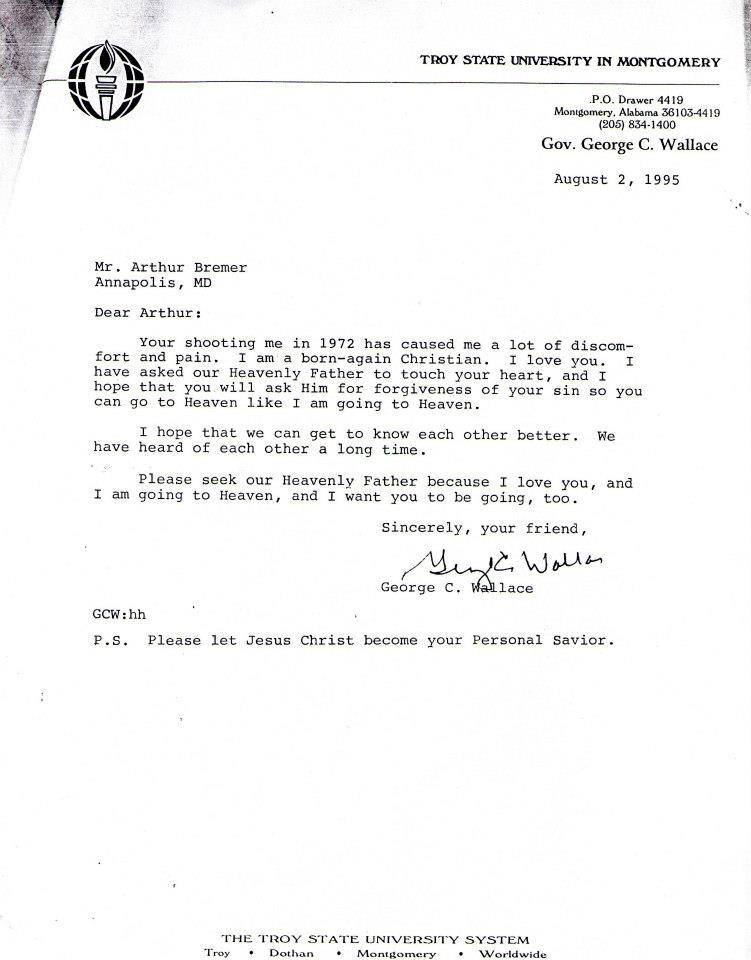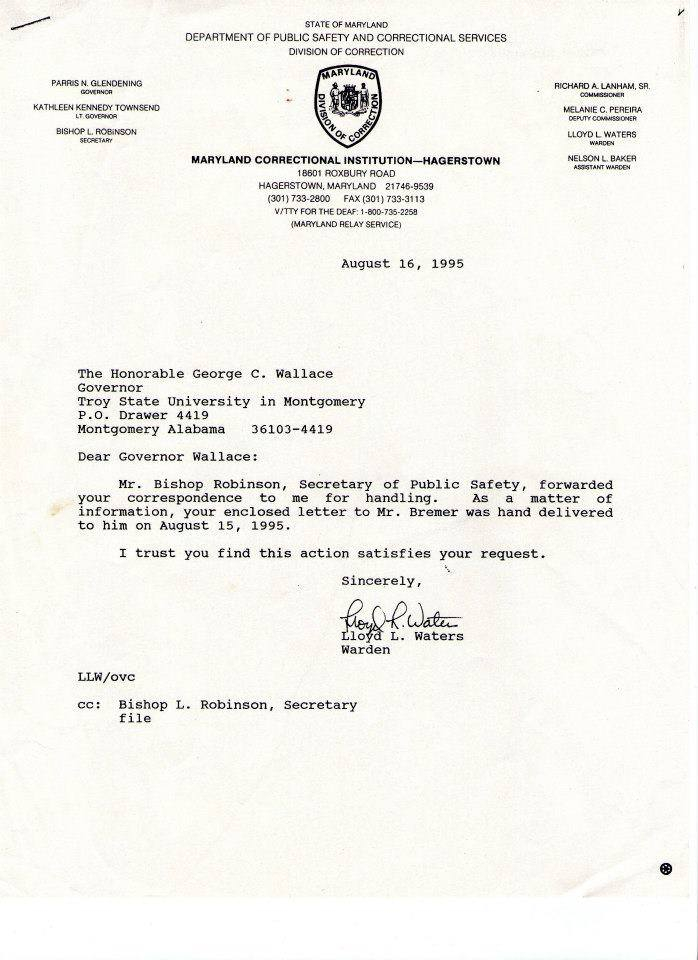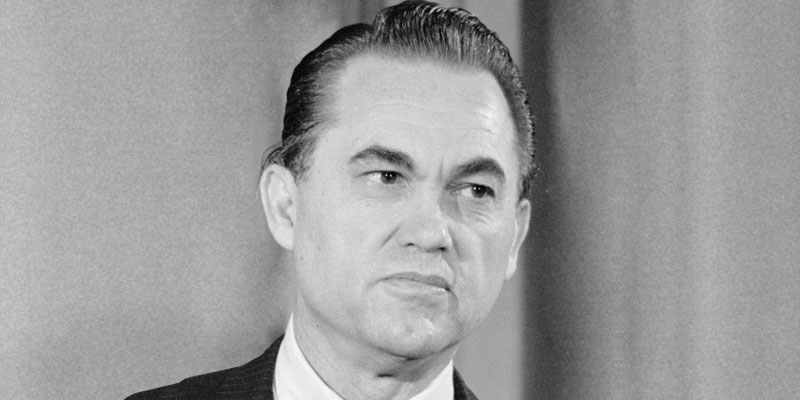On May 15, 1972 – 51 years ago today – Alabama Gov. George Wallace was shot and paralyzed during an assassination attempt while campaigning for the Democratic presidential nomination, and this anniversary offers an appropriate time to share the story of a stunning historic discovery that I made while working for him almost 25 years after the event occurred.
Shortly after noon on the day his life would change forever, Gov. Wallace had just finished
having lunch at a Howard Johnson’s restaurant and was motorcading to a campaign rally in the parking lot of the Laurel Shopping Center in Laurel, Md.
The governor had recently won the Florida Democratic presidential primary by carrying every county except Dade. He had also won the Tennessee and North Carolina primaries and finished second in Wisconsin, Pennsylvania, Indiana, and West Virginia. Every poll counted him as the odds-on favorite to win both the Maryland and Michigan primaries on the next day, May 16.
In fact, at this point in the presidential campaign, Gov. Wallace had amassed more primary votes than all of his Democratic opponents.
It had been raining and humidity was high that afternoon, so the governor, who knew the
campaign podium he stood behind was armor-plated, declined to wear the hot and bulky
bulletproof vest that was available to him.
The audience at the rally was loud and receptive to his speech, and after his remarks, Gov. Wallace decided to plunge into the crowd to shake hands. His Secret Service detail voiced objections, but he waved them off and said he would take full responsibility if anything happened.
The heat and humidity prompted him to take off his suit coat before leaving the stage, which revealed his blue, short-sleeved dress shirt and polyester Countess Mara necktie.
Seconds later, his life’s path crossed with Arthur Bremer’s.
It is an understatement to say Bremer was a troubled guy. A 26-year-old busboy from Milwaukee, Wisc., Bremer had been rejected by a 16-year-old girl he was dating, so he
decided to win back her affections by killing the president of the United States.
Bremer used all of his savings to stalk President Richard Nixon at his various speeches and appearances across the country, and he got close enough to take a shot at the president at an economic summit in Ottawa, Canada, but the heavy Secret Service presence and a line of Canadian mounties standing three deep scared him off.
Bremer kept a diary during his hunting of the president, and he wrote in it that night, “If I can’t kill Nixon, I’ll kill Wallace,” who was the obvious Democratic frontrunner.
If you have seen the movie “Taxi Driver,” it is well-documented that Robert DeNiro’s character, Travis Bickle, was based upon Arthur Bremer and the diary he kept. In one of history’s great twists, it is interesting to note that Arthur Bremer inspired the character Travis Bickle, and Travis Bickle later inspired John Hinkley to shoot Ronald Reagan.
As Gov. Wallace was shaking hands with the crowd in Laurel, Bremer pulled out a .38 caliber revolver he had purchased for $90 and fired five shots at point blank range. Two of the bullets struck the governor in the abdomen, one of them hitting his spinal column and instantly paralyzing his lower body for the rest of his life.
Secret Service agent Nick Zarvos was shot in the throat and would never again speak above a whisper. E.C. Dothard, an Alabama State Trooper on the Wallace security detail, was shot in the stomach, and Dora Thompson, a 34-year-old Wallace campaign volunteer from Hyattsville, Md., sustained a gunshot would to her leg from a bullet that ricocheted off of the asphalt parking lot.
Now, flash forward from that chaotic and violent scene to the mid-1990s, when I served as George Wallace’s last press spokesman and personal aide.
Retired from office for almost a decade during the years I worked for him, the governor was the subject of a Turner Network Television mini-series that was being produced about his life and starred Gary Sinise. Angelina Jolie, in one of her first roles, had been cast as Wallace’s second wife, Cornelia.
Two documentaries about the governor were also in production, and authors and journalists constantly sought his reflections on both national issues and civil rights history.
But Gov. Wallace was at an age where he, quite frankly, could no longer talk to the press as he once had, and he needed assistance, so I became his personal aide and spokesman. As a passionate history buff, I appreciated the opportunity to sit and hear stories about great and important events being told to me on a daily basis by someone who had actually lived them.
One day in 1996, we were in the suite of offices that the state still provided to Gov. Wallace in the Lurleen B. Wallace Office Building across from the Capitol, and I was looking through some boxes of his old files when I happened upon a copy of what I believe is among the most remarkable letters ever written.
It is one that Gov. Wallace dictated and mailed with no publicity or fanfare, and only the secretary who typed it knew it had been sent. The letter was written 23 years after the shooting in Laurel, and if some unseen hand hadn’t guided me to pull that particular file folder out of that particular box on that particular day, the letter would probably remain undiscovered today.
Dated Aug. 2, 1995 and addressed simply to “Mr. Arthur Bremer Annapolis, Maryland,” the letter on Gov. Wallace’s letterhead read:

“Dear Arthur,
Your shooting me in 1972 has caused me a lot of discomfort and pain. I am a born-again
Christian. I love you. I have asked our Heavenly Father to touch your heart, and I hope that you will ask Him for forgiveness of your sin so you can go to Heaven like I am going to Heaven.
“I hope that we can get to know each other better. We have heard of each other a long time.
“Please seek our Heavenly Father because I love you, and I am going to Heaven, and I want you to be going, too.
“Sincerely, your friend,
“George C. Wallace
“P.S. Please let Jesus Christ become your Personal Savior.”
The same file also contained a reply from the warden of the Hagerstown, Md., correctional
facility where Bremer was incarcerated, and it read, in part, “As a matter of information, your letter to Mr. Bremer was hand delivered to him on August 15, 1995. I trust you find this action satisfies your request.”

Think for a moment about the life-changing turmoil Arthur Bremer’s actions forced upon George Wallace.
It denied him his chance to win the presidency in 1972 and 1976.
His permanent injuries contributed, at least in part, to the dissolution of two of his marriages.
Anyone who knows a paraplegic who suffers from phantom pain is aware it is the sensation of excruciating pain in the legs that no longer have feeling, so no treatment for it exists – there is no way to alleviate that unremitting pain.
He was an energetic, forceful, and active man who was suddenly and forever confined to a
wheelchair by Arthur Bremer.
I hope that sharing Gov. Wallace’s letter on the anniversary of his shooting reminds all of us of Jesus’ admonition to forgive and turn the other cheek.
The next time you are mad or angry or seeking retribution for something you think someone did to you, stop and consider – if George Wallace could write those words to Arthur Bremer, perhaps I can find it in my heart to forgive those who have wronged me in far lesser and more temporary ways.
After finding the letter in his files, I showed the copy to Gov. Wallace and asked what led him to write it. He answered simply, “How can I ask Jesus to forgive my sins if I can’t forgive Arthur Bremer for his?”
As an epilogue to this story, I will note that Arthur Bremer was paroled from prison in 2007 after serving 35 years of his 53-year sentence. Under the terms of his release, Bremer will be on probation until 2025, when he will be 75 years old.
He remains under constant electronic monitoring, must avoid all elected officials and candidates, undergoes regular mental evaluations, and may not leave Maryland without written permission and supervision.
At last report, Arthur Bremer lives in rural Maryland, where he works in a furniture factory and remains under watch by the U.S. Secret Service.
To this day, Arthur Bremer has never publicly discussed his attempt to kill George Wallace, nor has he discussed his reaction to a remarkable letter that was handed to him by a prison warden in the summer of 1995.
And on Sept. 13, 1998, Gov. George C. Wallace went to Heaven … just like he hoped. Arthur Bremer will one day go to Heaven, too.
David Azbell is a 28-year veteran of Alabama politics and has served as press spokesman for Alabama Govs. George Wallace, Fob James, and Bob Riley. He is the creator of “The Art of Alabama Politics,” a popular Facebook group that shares unique and little-known stories from state political history.













